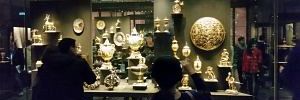This is an old revision of the document!
Deutsche Version | Wiki Start | Theme Collection ix
Birth of Jesus - History and Perception II ...
Wednesday, Dec 05, 2019. Talking about facts and history, we are discussing the birth of Jesus. There are many things to say here about the gospels and their way to present the story. You might read the Christmas story following Luke, from Chapter 2. Or you look into Matthew Chapters 1 and 2.
There are several events told in connection with the birth of Jesus. Also, Matthew and Luke have a slightly different way to put the event into historical context - Matthew referring to Herod the Great, Luke to Quirinius and the many censuses, which the Roman emperor Augustus initiated during his lifetime. We have discussed this already earlier. In any case, both Gospels name relatively clear reference points which are well-known historical periods, with the exception that Quirinius was governor in Palestine from 6-21 AD, before that he held many positions between Northern Africa, Rome, modern Turkey and Syria, which might have included Palestine, but that is not fully clear. He conducted a census in 7 AD, but it is not known if this was the first census Luke refers to. References to the Roman emperor Tiberius and to the governor Pilate fit into the story completely, supporting a birth of Jesus about 6-4 BC.
Events around the birth of Jesus …
There are more events told about the birth of Jesus. We have already discussed the fact that he is born in very poor circumstances in a town which was completely insignificant with respect to worldly and even spiritual standards.
But there are the shepherds, to which an angel comes and tells them to see the kid. We hear about heavenly praise on this particular occasion. You could, of course, put these stories into a box of fairy tales. Today, modern worldly theology has big difficulties to accept angels and supernatural events. They are not acceptable as “scientific” - they are not accessible to experiments. We would not be able to explain them with our understanding of natural laws. They are not standard experience of humans today, at least not in a way which we would be able to pin down to something we could investigate.
Science as it stands has no other choice than to classify the supernatural elements of the story as perception or interpretation or later legends which arose from oral communication of the early church.
My point here, as a scientist, is to fully understand the way science works and has to work. We need to understand the strength of the scientific method. We need to understand how science interacts with many of the biblical stories. And we need to understand the limitations of the scientific approach.
Science will not accept that an angel appeared to the shepherds. It will not be able to accept it, since it is based on the assumption that all events can be understood by natural laws, which might include statistical laws today. But an angel is neither a part of our natural world nor is it a statistical phenomenon.
What happened? …
Still, we need to ask: what happened around the birth of Jesus? Is it possible that there were angels and the multitude of the heavenly host?
It is clear that science cannot explain it. It is also clear that science, as it works, has not any tool or eye or approach to take supernatural events into its lines of arguments. It can look at the outcome of some events. It can investigate someone who is healed. But when the healing took place in a supernatural way, it cannot say much about it.
We also need to understand that the approach of science, looking for natural causes, has led to many inventions and a very far reaching understanding of the natural world. We have learned so much about the atmosphere, about human medical conditions, our body, biology, chemistry, physics, sociology, history etc etc. It is good to have a mode of mind which tries to understand the natural laws of a world which seems to be governed by such laws to a large extent!
Still, we also need to understand that our understanding of this world is still extremely limited. Often, we understand some parts of the processes. We understand some laws. But we do not understand them completely, and we do not understand the complete depth and breadth and complexity of events and processes. Mathematics can do a lot, and has improved in an astonishing way in the past 500 years. Yet, we still have deep difficulties to understand intelligence, emotion, will, desire and the full functioning of our environmental system!
You might ask, if the spiritual world exists. It is an old question - and our world is coming back to it. Esotericism is growing in a world longing for more. The question of angels and heavenly hosts is linked to this spiritual world, and to its interaction with the physical world as we know it.
If you ask me, I am very much convinced that the spiritual world exists. There is matter, and there is spirit. God is spirit. And humans also have their spirit, we are part of both worlds. The spiritual world exists and is alife as it always was. This is the basis of my understanding - and from this I can ask in what way the spiritual world interacts with the physical world. I am also convinced that wonders are possible, that God has the power and all possibilities to do what he wants at the interface between our natural world, our spiritual world and our whole life, with all what is in it. There is much to discuss and to discover here - stay patient and let us go step by step. (Roland Potthast)
This is part of the trilogy project “Faith of a Scientist”.





